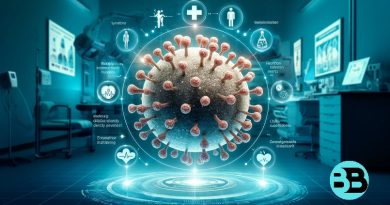How can AI be used to improve healthcare delivery and patient outcomes?
AI has the potential to revolutionize healthcare delivery and improve patient outcomes in several ways. Here are some examples:
Medical Diagnosis
AI algorithms can analyze medical data, such as medical images, electronic health records, and lab results, to make accurate diagnoses faster and more efficiently. This can lead to earlier detection and treatment of diseases, resulting in better patient outcomes.
Personalized Treatment
AI can help healthcare providers develop personalized treatment plans by analyzing patient data and predicting how a patient is likely to respond to a particular treatment. This can help healthcare providers choose the most effective treatment for each patient, resulting in better outcomes and fewer side effects.
Predictive Analytics
AI can help healthcare providers identify patients who are at risk of developing certain health conditions or complications before they become serious. This can help healthcare providers intervene early and prevent more serious health problems from developing.
Remote Patient Monitoring
AI-powered devices can monitor patients remotely and alert healthcare providers if there are any changes in the patient’s condition. This can help healthcare providers respond quickly and prevent serious complications.
Administrative Efficiency
AI can help healthcare organizations streamline administrative tasks such as scheduling appointments, managing patient records, and billing. This can free up healthcare providers’ time to focus on patient care and improve overall healthcare delivery.
Drug Development
AI can assist in drug discovery by analyzing large amounts of data to identify potential drug targets and predict their efficacy. This can speed up the drug development process and lead to the development of more effective drugs.
Surgical Assistance
AI can assist surgeons in performing complex procedures by providing real-time guidance and feedback. This can help reduce the risk of complications and improve surgical outcomes.
Health Monitoring
AI-powered wearable devices can monitor patients’ vital signs and alert healthcare providers if there are any abnormalities. This can help healthcare providers intervene early and prevent serious complications.
Chronic Disease Management
AI can help healthcare providers manage chronic diseases such as diabetes and hypertension by analyzing patient data and providing personalized treatment recommendations. This can help patients better manage their conditions and prevent complications.
Medical Research
AI can assist medical researchers in analyzing large amounts of data to identify patterns and insights that may lead to new treatments or interventions. This can help accelerate medical research and improve patient outcomes.
Language Translation
AI-powered language translation tools can help healthcare providers communicate with patients who speak different languages, improving access to healthcare and reducing the risk of miscommunication.
Mental Health Care
AI can assist in the diagnosis and treatment of mental health conditions by analyzing patient data, identifying patterns, and providing personalized treatment recommendations. This can help improve mental health outcomes and reduce the stigma surrounding mental illness.
Patient Engagement
AI-powered chatbots can provide patients with personalized information and support, helping to improve patient engagement and promote healthy behaviors.
Emergency Response
AI can help emergency responders quickly and accurately assess a patient’s condition and provide appropriate treatment, potentially saving lives and improving outcomes.
Medical Education
AI can help medical students and healthcare professionals learn and stay up-to-date with the latest medical research and practices, improving the quality of healthcare delivery.
Clinical Trials
AI can assist in the design and analysis of clinical trials, helping to identify appropriate patient populations, optimize treatment protocols, and analyze data more efficiently.
Quality Control
AI can help healthcare organizations monitor and maintain quality standards, identifying areas for improvement and reducing the risk of errors or adverse events.
Public Health Surveillance
AI can analyze population health data to identify disease outbreaks, monitor disease trends, and predict future health risks. This can help public health officials respond more quickly and effectively to emerging health threats.
Medical Imaging
AI can assist in the interpretation of medical images, helping to identify subtle abnormalities that might be missed by human radiologists. This can lead to earlier detection and more accurate diagnoses.
Health Insurance
AI can help health insurance companies analyze patient data to identify high-risk patients, predict future healthcare costs, and design more effective insurance policies.
Patient Adherence
AI can assist healthcare providers in monitoring patient adherence to treatment plans and providing personalized support and reminders to help patients stay on track.
Electronic Health Records (EHRs)
AI can help healthcare organizations manage large volumes of patient data more efficiently, making it easier to access and analyze patient information and improving the accuracy of diagnoses and treatment recommendations.
Disease Prevention
AI can help healthcare providers identify patients who are at risk of developing certain diseases or conditions, and provide personalized recommendations for prevention and early intervention.
Patient Safety
AI can assist in the detection of errors and adverse events, helping to improve patient safety and prevent medical errors.
Home Healthcare
AI-powered home healthcare devices can monitor patients’ health and well-being in real-time, alerting healthcare providers if there are any issues and helping patients manage chronic conditions from the comfort of their own homes.
Resource Optimization
AI can help healthcare organizations optimize the use of resources such as staff, equipment, and supplies, improving efficiency and reducing costs.
Telemedicine
AI can assist healthcare providers in delivering remote care, and providing real-time guidance and support to patients in remote or underserved areas.
Personalized Nutrition
AI can help healthcare providers develop personalized nutrition plans for patients, taking into account factors such as genetics, medical history, and lifestyle.
Elder Care
AI-powered devices can monitor the health and well-being of elderly patients, providing real-time alerts to caregivers if there are any issues.
Drug Adverse Event Detection
AI can help healthcare providers identify adverse events related to drug therapies, helping to improve patient safety and prevent adverse drug reactions.
Chronic Disease Management
AI can assist healthcare providers in managing chronic diseases such as diabetes, asthma, and heart disease by monitoring patients’ symptoms and providing personalized treatment recommendations.
Clinical Decision Support
AI-powered clinical decision support systems can provide healthcare providers with real-time guidance and support, helping to improve the accuracy of diagnoses and treatment recommendations.
Patient Privacy
AI can help protect patient privacy by identifying and removing identifying information from medical records and other healthcare data.
Social Determinants of Health
AI can help healthcare providers identify social determinants of health such as poverty, housing insecurity, and food insecurity, and provide personalized recommendations for addressing these issues.
Remote Monitoring
AI-powered remote monitoring devices can help healthcare providers monitor patients’ health and well-being in real time, providing early intervention and preventing hospital readmissions.
Drug Discovery
AI can assist in the discovery of new drugs by analyzing vast amounts of data and identifying potential drug targets more quickly and accurately.
Mental Health
AI can help healthcare providers in the diagnosis and treatment of mental health conditions such as depression and anxiety, by analyzing patient data and providing personalized treatment recommendations.
Precision Medicine
AI can help healthcare providers develop personalized treatment plans for patients based on their individual characteristics such as genetics, medical history, and lifestyle.
Natural Language Processing (NLP)
AI-powered NLP can help healthcare providers extract valuable information from unstructured data such as medical notes and patient feedback.
Clinical Workflow Optimization
AI can help healthcare providers optimize clinical workflows by identifying bottlenecks and inefficiencies and providing recommendations for improvement.
Overall, the potential applications of AI in healthcare are vast and varied. From drug discovery to mental health and precision medicine, AI has the potential to transform the way healthcare is delivered and ultimately improve the health and well-being of patients around the world. By leveraging the power of advanced technologies such as machine learning and natural language processing, healthcare providers can deliver more personalized, efficient, and effective care to patients, ultimately improving health outcomes and enhancing the overall patient experience.





Thank you for providing me with these article examples. May I ask you a question?